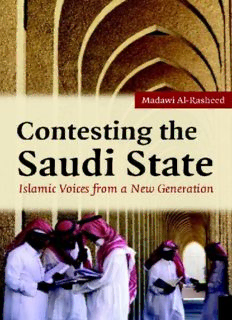
Contesting the Saudi State: Islamic Voices from a New Generation PDF
Preview Contesting the Saudi State: Islamic Voices from a New Generation
Contesting the Saudi State The terms Wahhabi or Salafi are seen as interchangeable and frequently misunderstood by outsiders.However,as Madawi Al-Rasheed explains in a fascinating exploration of Saudi Arabia in the twenty-first century, even Saudis do not agree on their meaning.Under the influence of mass education,printing,new communication technology,and global media, they are forming their own conclusions and debating religion and poli- tics in traditional and novel venues,often violating official taboos and the conservative values of Saudi society.Drawing on classical religious sources,contemporary readings and interviews,Al-Rasheed presents an ethnography of consent and contest,exploring the fluidity of the boun- daries between the religious and political.Bridging the gap between text and context,the author also examines how states and citizens manipu- late religious discourse for purely political ends,and how this manipula- tion generates unpredictable reactions whose control escapes those who initiated them. madawi al-rasheed is Professor of Anthropology of Religion at King’s College,University of London.She specialises in Saudi history, society,politics and religion.Her recent publications include A History of Saudi Arabia (2002) and Transnational Connections and the Arab Gulf (2005). Cambridge Middle East Studies 25 Editorial Board Charles Tripp (general editor) Julia A.Clancy-Smith,F.Gregory Gause, Yezid Sayigh,Avi Shlaim,Judith E.Tucker Cambridge Middle East Studieshas been established to publish books on the nineteenth- and twentieth-century Middle East and North Africa.The aim of the series is to provide new and original interpretations of aspects of Middle Eastern societies and their histories.To achieve disciplinary diversity, books will be solicited from authors writing in a wide range of fields including history,sociology,anthropology,political science,and political economy.The emphasis will be on producing books offering an original approach along the- oretical and empirical lines.The series is intended for students and acade- mics,but the more accessible and wide-ranging studies will also appeal to the interested general reader. A list of books in the series can be found after the index. Contesting the Saudi State Islamic Voices from a New Generation Madawi Al-Rasheed University of London CAMBRIDGEUNIVERSITYPRESS Cambridge,NewYork,Melbourne,Madrid,CapeTown,Singapore,SãoPaulo Cambridge University Press TheEdinburghBuilding,CambridgeCB28RU,UK Published in the United States of America by Cambridge University Press, New York www.cambridge.org Information on this title: www.cambridge.org/9780521858366 © Madawi Al-Rasheed 2007 Thispublicationisincopyright.Subjecttostatutoryexceptionandtotheprovisionof relevantcollectivelicensingagreements,noreproductionofanypartmaytakeplace withoutthewrittenpermissionofCambridgeUniversityPress. Firstpublishedinprintformat 2006 ISBN-13 978-0-511-26867-0 eBook(EBL) ISBN-10 0-511-26867-X eBook(EBL) ISBN-13 978-0-521-85836-6 hardback ISBN-10 0-521-85836-4 hardback CambridgeUniversityPresshasnoresponsibilityforthepersistenceoraccuracyofurls forexternalorthird-partyinternetwebsitesreferredtointhispublication,anddoesnot guaranteethatanycontentonsuchwebsitesis,orwillremain,accurateorappropriate. A prince is always compelled to injure those who have made him the new ruler, subjecting them to the troops and imposing the endless other hardships which his new conquest entails Niccolo Machiavelli The Prince Contents Glossary pageviii Map xxi Introduction:debating religion and politics in the twenty-first century 1 1 Consenting subjects:official Wahhabi religio-political discourse 22 2 Re-enchanting politics:Sahwis from contestation to co-optation 59 3 Struggling in the way of God abroad:from localism to transnationalism 102 4 Struggling in the way of God at home:the politics and poetics of jihad 134 5 Debating Salafis:Lewis Atiyat Allah and the jihad obligation 175 6 Searching for the unmediated word of God 211 Conclusion 254 Notes 263 Bibliography 292 Index of personal names 303 Index of place names 306 General index 307 vii Glossary ahfad al-sahaba grandsons of the companions of the Prophet ahl al-dhimma people of the book,Christians and Jews ahl al-hadith those who interpret the Prophetic tradition literally ahl al-hall wa (cid:2)l-(cid:3)aqd decision makers (lit.‘people who loose and tie’) ahl al-qibla people who face Mecca for prayer ahl al-sunna wa (cid:2)l-jama(cid:3)a Sunnis (lit.‘people of the tradition of the Prophet and community’) ahl al-tawhid people of monotheism aimat al-da(cid:3)wa al-najdiyya Najdi religious scholars amir( pl.umara) ruler,prince amr bi (cid:2)l-ma(cid:3)ruf wa (cid:2)l-nahy promotion of virtue and prohibition of vice (cid:3)an al-munkar (cid:3)aqida creed asl principle baghi(pl.bughat) usurper bara(cid:2) dissociation from infidels bay(cid:3)a oath of allegiance bid(cid:3)a innovation,heresy bilad al-haramayn the Land of the Two Holy Mosques da(cid:3)if weak da(cid:3)iyya(f.da(cid:3)iyyat;pl.du(cid:3)at) preacher da(cid:3)wa religious call,mission dawla state dawlat al-tawhid monotheist polity dhal one who has gone astray dhalal debauchery,obscurity du(cid:3)at al-islah reformers fajir sinful,despotic fard(cid:3)ayn anobligationincumbentuponeveryMuslim viii Glossary ix fard kifaya an obligation performed by a sufficient number of Muslims fasiq debauched fatwa religious opinion issued by shari(cid:3)aexpert al-fi(cid:2)a al-dhalla the group that has gone astray fiqh Islamic jurisprudence fitna strife,dissent Hadith tradition,saying of the Prophet hajr al-mubta(cid:3)di(cid:3) ostracisation of innovators hakim ruler hakimiyya sovereignty haraki politicised activist haram forbidden harb(cid:3)ala al-kuffar a battle against the infidels hayat al-amr bi(cid:2)l-ma(cid:3)ruf wa Committee for the Promotion of Virtue (cid:2)l-nahy (cid:3)an al-munkar and Prohibition of Vice hijra migration hizb al-ghulat radicals hizbiyya adherence to party politics hizb al-wulat loyalists (cid:3)ibada(pl.(cid:3)ibadat) Islamic rituals,worship ijtihad applying reason to reach a religious ruling (cid:3)ilm knowledge (cid:3)ilmani(pl.(cid:3)ilmaniyyun) secular,secularist imama state,leadership of the Muslim state inkar al-munkar disavowing the abominable iqamat al-hadd punishment (pl.iqamat al-hudud) islah reform islahi(f.islahiyya; reformer pl.islahiyyin,islahiyyat) jahil one who is ignorant jahiliyya the age of ignorance ja(cid:2)ir despot jami(cid:3)at al-(cid:3)ulama association of (cid:3)ulama jazirat al-(cid:3)arab/jazira the Arabian Peninsula al-(cid:3)arabiyya jihad exertion,struggle for the way of God kafir(pl.kafirun) unbeliever,blasphemous khawarij al-(cid:3)asr contemporary Kharijites al-khitab al-dini religious discourse khuruj bi (cid:2)l-sayf violent rebellion
Description: